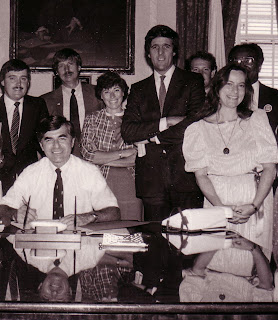NOTE: to be submitted at a public hearing on May 30, 2012
to Mark D. Marini, Secretary, Department of Public Utilities
One South Station, 5th Floor, Boston, MA 02110
One South Station, 5th Floor, Boston, MA 02110
Docket Reference D.P.U. 12-30
It is small comfort to realize if mankind is rendered extinct
through continued, wanton use of greenhouse gas emitting fossil fuels, the planet
may return to the floral lushness of the proverbial Garden of Paradise MINUS
Adam, the perpetrator of his own demise.
Today, California smog threatens the giant redwoods – smog
created from energy production and trucking, diesel freight train corridors, motor vehicle exhausts, solvents, pesticides and other fossil
fuel derived compounds, along with fires escalated by sustained winds that ravage
unmanaged forest landscapes. Meanwhile, East
Coast cities are also shrouded in a cocoon of air-borne pollutants. It seems as if the natural world has turned
against those who would be its master.
Though some regard natural gas
with its reduced CO2 content as the gold standard of fuels, they fail to
measure its true cost – the environmental catastrophe to aquifers caused by
fracking which can be likened to blowing up mountain tops to extract coal, or
putting our oceans’ flora and fauna at risk through deep water drilling. Gas, coal, oil are all fossil fuels that
generate global warming and climate change.
Their toxins are dead matter, EXCESS carbon exhumed from biomass created
eons ago. These toxins overload the
atmosphere and cannot be successfully recaptured – though we are stressing our
forests to the max attempting to do so.
Yes, even natural gas is a fossil fuel – not part of the living,
breathing world. It too needs to be
phased out if we humans are to survive.
Cape
Wind, however, offers hope of a cleaner, healthier world. The
ocean’s wind currents, close to a land base, can harness energy that can be
captured without destroying forests and farmlands so vitally needed for food
and shelter and fiber-based products. Offshore
wind farms harness more frequent and powerful winds than are available to
land-based installations and have less visual impact. By utilizing ocean
borne wind energy - working in tandem with solar, geothermal, hydro and sustainably
harvested biomass that recaptures its own gasses as it re-grows and regenerates
itself as part of the natural cycle of life – we are using natural resources native
to the atmosphere to help power our collective global civilizations.
The crisp, pollution-free, off-shore Cape Wind, in conjunction with other
renewables, can be harnessed to create bio-based fuels for transport and bio-based
non-toxic products and chemicals that will produce jobs within the manufacturing,
farming and forestry industry. This, in
turn, will help foster clean air, clean water and soil, as well as flourishing biodiversity amid flora and fauna as an overly mature
forest is sustainably harvested and put less at risk for disease and fire.
But if Massachusetts
is to become part of this legacy, it is critical that the Department of Energy
Resource’s (DOER) abide by its stated commitment to apply the best possible
science for wind, solar and biomass and all other renewables in the face of the
opposition to each of these technologies that exists.
Perhaps someday - through the
use of off-shore wind, solar, geothermal, hydro and sustainably harvested biomass and other
non-harmful technologies yet to be developed – we can reduce the territorial
conflicts among people so often generated by a fight for resources – and come
to live in balance and harmony with nature in what future generations may come
to regard as a true Paradise.
NOTE: Genevieve Fraser was awarded an MA Environmental Commendation for organizing Acid Rain Awareness Campaigns.
NOTE: Genevieve Fraser was awarded an MA Environmental Commendation for organizing Acid Rain Awareness Campaigns.

No comments:
Post a Comment